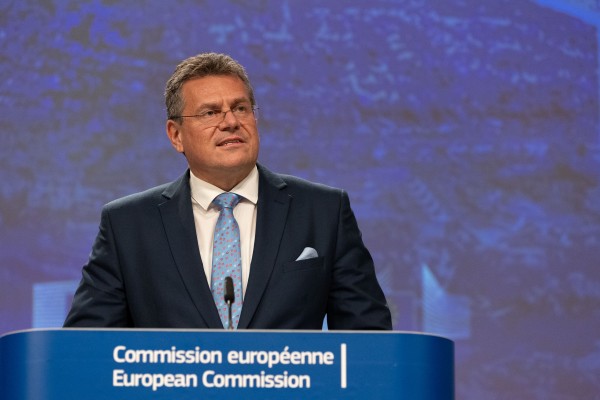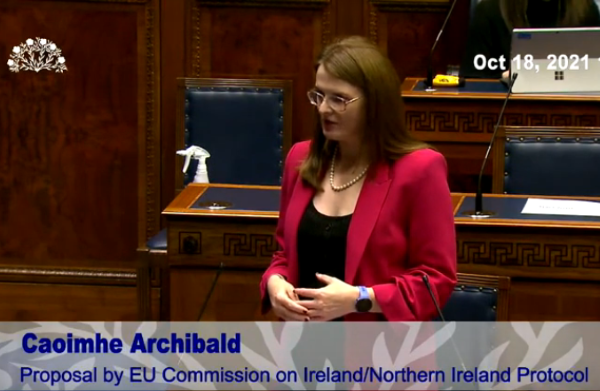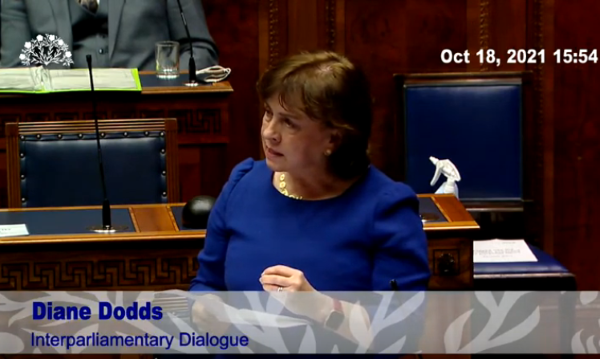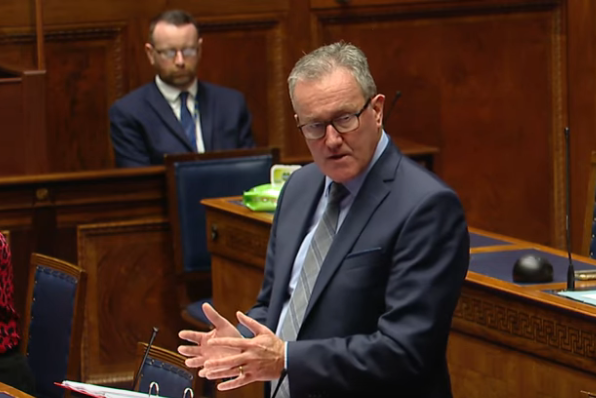Brexit & Beyond Newsletter
20 October 2021

Welcome to the 20 October 2021 Brexit & Beyond newsletter
The European Commission has put forward proposals on the implementation of the Protocol on Ireland/Northern Ireland. In the NI Assembly, MLAs have commented on the Commission’s proposals, and debated a motion on enhanced dialogue between the Assembly and the European Parliament. UK Brexit Minister Lord Frost gave a speech in Lisbon outlining the UK’s view on the Protocol and UK-EU relations.
European Commission publishes Protocol proposals
Last Wednesday evening (13 October), European Commission Vice-President Maroš Šefčovič gave a speech announcing the EU’s proposals on the Protocol on Ireland/Northern Ireland and invited the UK Government to engage “earnestly andintensively” with them.
 European Commission Vice-President Maroš Šefčovič presented the proposals last Wednesday | Source: European Commission
European Commission Vice-President Maroš Šefčovič presented the proposals last Wednesday | Source: European Commission
The Commission proposes more engagement with Northern Ireland stakeholders and authorities, which could include greater transparency on the Joint Consultative Working Group, greater input from experts, and greater transparency regarding the EU law which applies to NI. Regarding a stronger link between the Northern Ireland Assembly and the EU-UK Parliamentary Partnership Assembly (PPA), the Commission says “further contacts with Parliament colleagues would be needed to see how the ideas of a Northern Ireland sub-structure could work.” The European Parliament recently published a list of its delegates to the PPA.
The Commission proposes more structured dialogue with stakeholders, including Northern Ireland civic society, business, and authorities, including with the co-chairs of the Joint Committee (Frost and Šefčovič), and in the Specialised Committee. The Commission points out that “primarily it would be for the UK Government to engage the Northern Ireland authorities in the work of joint bodies established under the Withdrawal Agreement and the Protocol. Any solution on this point should be in line with the UK’s constitutional order.”
On SPS measures, the Commission says it is proposing a bespoke solution which would result in an approximately 80% reduction in checks which would be required under the Protocol (in its full implementation). The conditions attached to this are the completion of permanent border control posts, specific labelling showing that goods are for sale in the UK only, and reinforced monitoring of supply chains. The Commission also proposes a rapid reaction mechanism to ensure the integrity of the EU single market. On customs, the Commission proposes an expansion of the ‘goods not at risk’ scheme, and simplified customs paperwork. The UK would be required to provide the EU with real-time and full access to its IT systems and provide “appropriate monitoring and enforcement measures”. Šefčovič said, “Combined with our proposed solutions in the area of sanitary and phytosanitary rules, this will create a type of “Express Lane”, vastly facilitating the movement of goods from Great Britain to Northern Ireland.”
On medicines, as Šefčovič put it, the EU “has completely turned [its] rules upside down and inside out to find a solid solution to an outstanding challenge.” The Commission says its proposal will secure the long-term supply of medicines to NI, including generic medicines. The Commission intends to hold further discussions with the UK and stakeholders before finalising the details. There have been concerns about the supply of innovative cancer treatments to Northern Ireland: the EU says these are approved by the European Medicines Agency and should the UK Medicines and Healthcare Products Regulatory Agency approve the treatment faster, “it will always be possible to bridge this short gap, and supply and administer the medicine concerned in Northern Ireland” under a special procedure.
Šefčovič met UK Brexit Minister Lord Frost on Friday “to start an intensive period of discussions” and a series of meetings are scheduled between the EU and UK this week. The EU says it “seeks to focus on the areas that matter most to Northern Irish people and businesses, and where we can find common ground.” The UK Government said, “Lord Frost recognised the efforts Vice President Šefčovič had made in bringing these forward, and underlined that we would discuss them constructively and in a positive spirit.”
Views from the NI Assembly
The BBC has a round-up of reactions to the EU’s proposals from Northern Ireland’s political parties and business groups. In the Assembly on Monday 18 October, Caoimhe Archibald (Sinn Féin) welcomed the proposals, saying they show that the Commission “has listened to business and political representatives and taken on board the issues and concerns raised and indicate that it is willing to be pragmatic and take action to alleviate them.” Jonathan Buckley (DUP) said the proposals “[fall] well short of the fundamental change required, and forthcoming negotiations will represent a real opportunity if Europe is serious about addressing the issues that arise from the Northern Ireland protocol. My party will watch closely how Europe and indeed its partners engage in the conversation.”
 Caoimhe Archibald speaking in the Assembly on Monday | Source: NI Assembly
Caoimhe Archibald speaking in the Assembly on Monday | Source: NI Assembly
Matthew O’Toole (SDLP) said, “My strong hope is that the UK Government and others in the Chamber move on and get on with agreeing those arrangements because we have the opportunity not just to deal with the very real consequences of Brexit for our society but to finally take some advantage of being at the crossroads of two major markets.” Steve Aiken (UUP) said, “We note very clearly that there has been no discussion about the role of the European Court of Justice (ECJ), which, again, is fundamental and goes to the question of democratic accountability.” He said he had spoken with Maroš Šefcovic about improved democratic accountability in the Northern Ireland Assembly: “That would mean our having the ability to actually veto or amend legislation or to be in a position to fully understand it and have those views represented. None of that has been laid in the paper or in the non-papers that have been brought before us.”
Stewart Dickson (Alliance) said, “We need to reduce the temperature of these discussions, not increase it…it would be an act of supreme folly to squander this chance to move on or, indeed, to impose even more delusional red lines.” Jim Allister (TUV) said the EU’s papers “fail the most important test that can ever be applied to any such proposals, namely the sovereignty test… despite any tinkering, it [the Protocol] will never be rendered acceptable to the unionist community in this Province: because it entails the EU clinging to its ill-gotten sovereignty over Northern Ireland.”
Inter-parliamentary dialogue
Caoimhe Archibald brought a private members’ motion on inter-parliamentary dialogue to the Assembly on 18 October, expressing support for formal dialogue between the Assembly and the European Parliament and calling on the President of the European Parliament to undertake work on this. She said, “It would send a strong signal if the Assembly formally endorsed direct dialogue between the two institutions, the form of which could be developed.”
Diane Dodds (DUP) tabled an amendment which said that the enhanced dialogue should be “subject to wider agreement on arrangements that replace the Protocol on Ireland/Northern Ireland and restore the democratic legitimacy of the devolved institutions”. She said, “The protocol does not have the consent of one unionist Member of the Northern Ireland Assembly. Until that is addressed, any further exercise in inter-parliamentary dialogue will be entirely superficial and detached from the needs of our constituents…The motion ignores the fundamentally undemocratic nature of the current arrangements for Northern Ireland in favour of having a talking shop.”
 Diane Dodds speaking in the Assembly | Source: NI Assembly
Diane Dodds speaking in the Assembly | Source: NI Assembly
Steve Aiken (UUP) supported the amendment. He said the negotiations on the Protocol “at the least, should include the parties who sit by right in the Executive. They should have direct involvement in the talks. As for the better communication and involvement with the EU institutions laid out in the non-paper, it is not good enough just being an observer.” Sinead McLaughlin (SDLP), supporting the motion, said her party has worked closely with Barry Andrews MEP “to ensure that the European Parliament considers further legislation that affects the North of Ireland and that it consults with the parties here and with local civic society, engaging properly and fully.” Andrew Muir (Alliance), supporting the motion, said, “The fact that we left the European Union does not mean that good relationships cannot continue. If anything, it is more important than ever that we foster those relationships and find different forums and structures through which to engage.” The motion was passed; the amendment was not agreed.
UK view
Lord Frost gave a speech in Lisbon the day before the EU announced its proposals. It addressed his ideological view of Brexit: “a [hard Brexit] was the only form of Brexit that allowed us freedom to experiment and freedom to act,” he said. The final section of his speech covered Northern Ireland. Frost said, “There is a widespread feeling in the UK that the EU did try to use Northern Ireland to encourage UK political forces to reverse the referendum result or at least to keep us closely aligned with the EU; and, moreover, that the Protocol represents a moment of EU overreach when the UK’s negotiating hand was tied.” Frost said he was sharing a new legal text of an amended Protocol with the European Commission. This, he said, takes into account the EU-UK Trade and Cooperation Agreement, which had not been agreed at the time the Protocol was signed. It would also remove the role of the European Court of Justice (ECJ) and replace this with international arbitration.
In the House of Lords on 13 October, Lord Frost was asked what consultation the Government has undertaken in Northern Ireland, pointing out that the Chief Executive of Manufacturing NI says that no one in business has raised the issue of ECJ oversight as a problem. Frost said, “I personally have heard quite a lot of concern about the imposition of European Union law in Northern Ireland without democratic consent; of course, the Court of Justice stands at the apex of that system.” Frost was asked when we will see the legal text on his proposals and said, “It is a negotiating document at the moment but, of course, I expect that we will make it public if that seems to be useful to the process in future.” Asked how he can argue that EU law applies in Northern Ireland without the UK’s consent, when the UK agreed the Protocol, Frost said, “there is, of course, a difference between what is in an international legal instrument and what happens day to day…The political difficulty being created in Northern Ireland is because individual legal instruments, which come out in profusion from the European Union day to day, are applied automatically in Northern Ireland without any sort of process.”
Further reading
Professor Katy Hayward writes “There is a long way to go before we find workable solutions – and at some pace, too, if we are to get there by Christmas. But at least the two men are now talking across a table rather than across the soundwaves.” The Irish Times has analysis on the internal EU work to get reluctant member states on board with the Commission’s proposals. The Institute for Government has an explainer on how far apart the EU and UK are on various Protocol matters.
Brexit in the plenary
In the NI Assembly on Monday 11 October, deputy First Minister Michelle O’Neill made a statement on the North-South Ministerial Council (NSMC) meeting in July. The discussion also moved to Brexit matters, and the £1 billion PEACE PLUS funding, which required approval from the NSMC.
Question Time – Executive Office
First Minister Paul Givan later took questions from MLAs. He was asked about unionist Ministers implementing the Protocol and said the DUP will “make an assessment of the outworkings of those [EU-UK] negotiations as to what is in the interests of Northern Ireland, but we are fundamentally of the position that the New Decade, New Approach commitment entered into by the UK Government on Northern Ireland's place in the internal market must be fully respected.”
The High Court’s ruling on ministerial attendance at NSMC meetings was raised. The court last Monday ruled that the DUP’s withdrawal from these bodies is unlawful. The First Minister said that they would provide a more detailed response after consideration. Last Tuesday a question for urgent oral answer was raised on the matter. The First Minister again stated the judgement is being considered and “the way to address the issues that have led us to this place is through a political resolution.” He went on to say, “I am pleased that there is now recognition on the part of the European Union and the United Kingdom Government that there are severe problems now as a result of the protocol. That was not the case until this party took action.” He stated that a NSMC health meeting would take place and “that meeting should approve the PEACE PLUS funding that the Finance Minister has requested.” On Thursday the funding was approved by the NSMC.
Question Time – Finance
On Monday 18 October, Finance Minister Conor Murphy was asked about the impact of Brexit on funding received from the EU. He noted that Northern Ireland no longer has access to programmes such as the European Social Fund (ESF), the European Regional Development Fund (ERDF) and the Connecting Europe Facility (CEF). On the Shared Prosperity Fund, set up by the UK Government to replace EU structural funds, he said, “[we have] been excluded from the policy development and design of that fund, which is likely to be delivered centrally by Whitehall, bypassing the Executive. The result is an annual loss of £70 million to the Executive's spending power.”
 Finance Minister Conor Murphy took questions in the chamber on Monday | Source: NI Assembly
Finance Minister Conor Murphy took questions in the chamber on Monday | Source: NI Assembly
The Finance Minister told the chamber that he and Executive colleagues “previously asked that the Department for the Economy put forward a prospectus on the benefits of having one foot in the British markets and one foot in the European markets. As yet, we have not received anything.”
Mr Murphy also confirmed that the budget for PEACE PLUS has been approved: “The Special EU Programmes Body (SEUPB) produced a final draft cooperation programme document, which the Executive approved under urgent procedures last Wednesday. The North/South Ministerial Council (NSMC) agreement was obtained on Thursday 14 October 2021 at the health and food safety meeting. Irish Government approval is also in place. The programme will now be submitted to the European Commission for its consideration and approval. It is hoped that all the necessary approvals will be in place in order to allow the SEUPB to open the programme for calls in early 2022,” he told the Assembly.
Labour shortages
On Monday 11 October, Caoimhe Archibald (Sinn Féin) brought a private members’ motion on labour shortages. She argued that “there is a need for the British Government to act urgently to address labour shortages and enable EU citizens to come here to work and live.” Matthew O’Toole (SDLP) argued that “the end of freedom of movement is not simply an economic problem; it is a societal tragedy. The ability to live and work across the European Union was an enormous benefit to not just workers in the economy but all of us.” Mike Nesbitt (UUP) said his party would not support the motion as they believed it to be too narrow: “Yes, we have labour shortages, but they are not all linked to the problems of Brexit, because there are skill shortages in continental Europe.” Stewart Dickson (Alliance) asked, “In the context of shortages of workers elsewhere, why would EU workers leave their home country to come to the UK, where they will be given only a few short months before they are told to leave, when they have the potential to go to 26 other countries and enjoy greater rights and the ability to settle there permanently?”
Minister of Agriculture, Environment and Rural Affairs, Edwin Poots (DUP) responded to the debate. He told the chamber that he and the Economy Minister have been making representations to the UK Government on the need for derogations for Northern Ireland: “We need a shortage occupations list for Northern Ireland, a relaxation of the English language requirement and the flexibility that short-term visas can bring,” he said. He said the UK Government’s announcement on temporary visas was welcome, “but it is clear that that is not enough and will not solve the wider labour supply issues that we face. That will be possible only with further changes to immigration policy.” The motion was passed by 48 votes to 37.
Committee for the Executive Office
On Wednesday 13 October, the First Minister and deputy First Minister were at the Committee for the Executive Office. Among other topics, the Protocol on Ireland/Northern Ireland and Ministers’ attendance at North-South Ministerial Council meetings were discussed. Deputy First Minister Michelle O’Neill referred to Lord Frost’s comments about the increase in North-South trade, saying “I can't see how that's a problem…I've always wanted to minimize any disruption to trade north-south and east-west.” First Minister Paul Givan said the displaced trade is “the evidence that justifies the triggering of Article 16 because the Protocol was never designed to…displace trade from operating on an east-west and to a changed position of north-south”. He added, “I want us to…have frictionless trade within the United Kingdom and with the Republic of Ireland and I think that's something that we're all agreed upon so let's encourage the UK Government and the European Union and to get us to that place.”
Common Frameworks
The Lords debated the Common Frameworks Scrutiny Committee’s report in the Grand Committee on 13 October. The Liaison Committee has agreed that the Committee will continue its work until next summer. The UK Government and devolved administrations have been developing common frameworks, which establish a common approach to policy areas previously governed by EU law and which intersect with areas of devolved competence.
The need for clarity on how the frameworks will interact with the Protocol on Ireland/Northern Ireland was raised by several peers, as was how policy divergence can be monitored and managed. Baroness Ritchie asked whether work is under way to gather intelligence about future regulatory developments in Brussels. Lord Greenhalgh, Minister of State at the Home Office and Ministry of Housing, Communities and Local Government, told the Lords that Neil O’Brien MP, the newly appointed Parliamentary Under Secretary of State for Levelling Up, The Union and Constitution, has taken over the role with responsibility for common frameworks which will now sit in the Department for Levelling Up, Housing and Communities. Greenhalgh said that “where proposals for divergence arise, the framework’s governance structures will ensure that views from all parties to the framework are taken into consideration.”
The Common Frameworks Scrutiny Committee has also published written evidence from the Institute for Government, the UK Environmental Law Association, and several academics. On the Protocol, the academics recommend “ongoing scrutiny to identify the complex and dynamic ways in which the Protocol interacts with Common Frameworks. The Committee may want to seek clarity on the extent to which Common Frameworks will be GB- or UK-wide in scope. The Committee may also seek to identify the cause of apparent problems in communication between Whitehall/Westminster and the Northern Ireland Assembly in relation to amendments to EU legislation that are subject to automatic application in Northern Ireland under the terms of the Protocol.”
Other news
- The Lords European Affairs Committee has published its report on the Free Trade Agreement (FTA) between the UK and Iceland, Norway, and Liechtenstein. It points out that the agreement will apply differently in Northern Ireland but “none of the Government’s explanatory materials—EM, Parliamentary Report or Impact Assessment—makes any reference to the interaction between the Free Trade Agreement and the Protocol [on Ireland/Northern Ireland]”. The Lords debated the FTA on 14 October. Minister of State at the Department for Business, Energy and Industrial Strategy and Department for International Trade Lord Grimstone said that “Northern Ireland businesses will of course benefit from the tariffs that we have agreed in this deal…business guidance will be published in the usual way in relation to this.”
- The UK Government has published a response to its consultation on Government engagement with business and civil society groups on implementation of the EU-UK Trade and Cooperation Agreement(TCA). The Government has also called for expressions of interest for membership of the Domestic Advisory Group and the Civil Society Forum - applications should be made by 9 November 2021. These fora will discuss the implementation of the TCA and can submit recommendations to the Government. The Government says it will ensure “that involvement in these groups is as balanced as it can be, including considering geographical and regional representation.”
This Week at the Assembly
- Monday 18 October, 12.30pm – Plenary – Matter of the Day: Protocol on Ireland/Northern Ireland: EU Commission Proposal; Private Members’ Motion - Interparliamentary Dialogue
- Wednesday 20 October, 10am - Committee for Infrastructure - EU Exit legislation
- Wednesday 20 October, 2pm - Committee for The Executive Office - Engagement with the Seanad Special Select Committee on the Withdrawal of the UK from the EU
- Thursday 21 October, 10.10am - Committee for Communities - EU Exit legislation
- Thursday 21 October, 11.15am - Committee for Agriculture, Environment and Rural Affairs - EU Exit legislation
- Thursday 21 October, 2.05pm - Committee for Justice - EU Exit and Justice Related Issues - Update
Catch up with Assembly business
- Monday 11 October, 2pm – Plenary - Question Time -The Executive Office
- Monday 11 October, 3.30pm – Plenary - Private Members’ Motion - Labour Shortages
- Tuesday 12 October, 2pm – Plenary - Question Time – Economy
- Wednesday 13 October, 2pm - Committee for The Executive Office - First Minister and deputy First Minister - Oral Briefing
- Thursday 14 October, 11.30am - Committee for Communities - EU Exit legislation
- Thursday 14 October, 10.10am - Committee for Agriculture, Environment and Rural Affairs - Written Briefing from DAERA – EU Exit legislation



